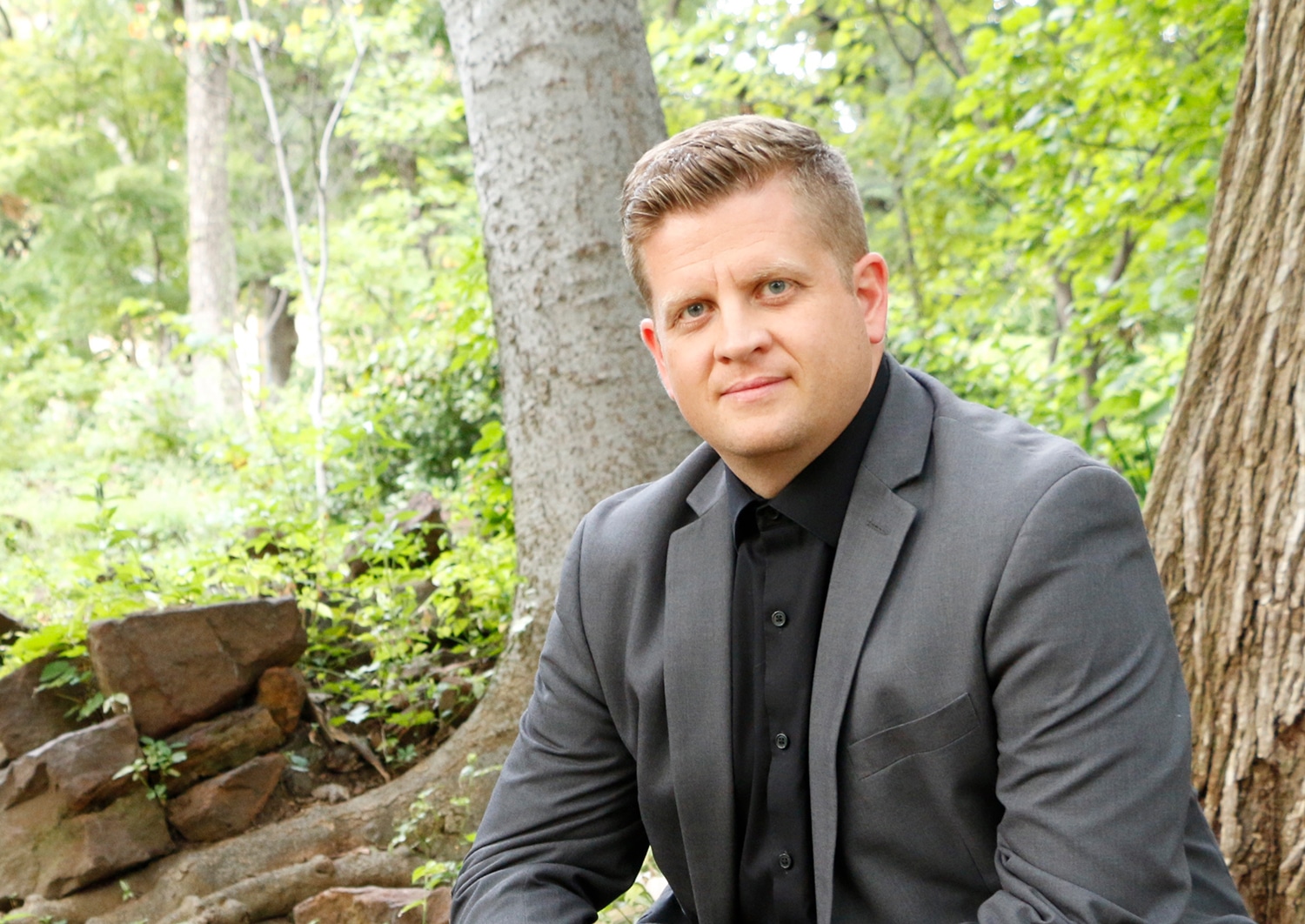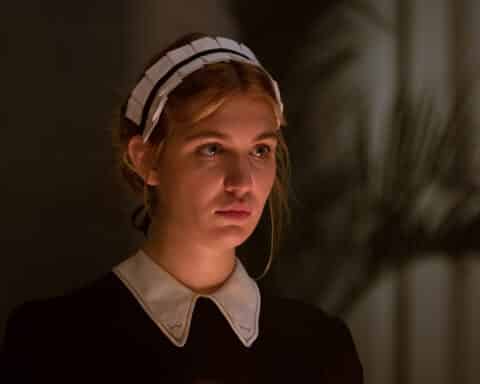Concert organist and composer S. Andrew Lloyd belongs to the Church of Jesus Christ of Latter-day Saints. But his latest composition, about to make its world debut, draws from the famous Catholic poem, “The Hound of Heaven.”
“As a composer, I want to give my listeners and my performers an opportunity to touch the divine,” the 44-year-old musician based in San Antonio, Texas, told Our Sunday Visitor. “If there’s an opportunity to have that experience, I want to give that to you.”
Lloyd spoke ahead of the world premiere of his new creation, “Amaranthine,” taking place at Carnegie Hall in New York City on April 9. The piece draws inspiration and takes its name from “The Hound of Heaven” by the Catholic English poet Francis Thompson (1859-1907). Selections from the poem — which describes God’s relentless pursuit of the human soul — appear in the composition for voice and piano.
The piece, which consists of five movements, will be performed by opera singer and Sony Classical artist Rachel Willis-Sørensen together with pianist Tamar Sanikidze. The performance presented by the Center for Latter-day Saint Arts comes after “Amaranthine” won the 2022 prize of The Ariel Bybee Endowment at the Center for Latter-day Saint Arts.
Lloyd, who serves as the Bess Hieronymus endowed fellow and assistant professor of organ and composition at the University of Texas at San Antonio, expressed excitement about the upcoming concert and applauded Willis-Sørensen as a world-class performer with a “transcendent” voice.
Referencing the concert program notes, he shared that the entire program, including his piece, “revolves around this idea of things hidden and then revealing themselves … of being brought to the light.”
Drawing from Catholicism
While addressing why he chose Thompon’s poem for his new composition, Lloyd revealed “an abiding love for Catholicism.”
He shared his admiration for Catholic composers such as Claudio Monteverdi, a priest and Italian composer, and Olivier Messiaen, a French composer and organist. Music from the Catholic tradition influences his own: He has drawn inspiration from Gregorian chant and even composed an album called “Christus,” which includes Latin texts from the Catholic Mass.
Music, he said, is his best friend.
“It’s the thing that connects me to God the most in my life, tethers me to him,” he said. “And I would say that some of the most beautiful pieces of music I’ve ever heard have come from the great incubator of sorts, the Catholic Church.”
Examining ‘The Hound of Heaven’
Lloyd explained why Thompson’s poem, which opens with the description of someone trying to flee from God’s presence, particularly appealed to him.
“I think that’s the implication of the poem … God is always there,” Lloyd shared his interpretation. “To the person in the poem, God’s voice feels booming and loud — it’s thunderous,” he said. “But in the end of the poem, you realize it never really was. It was always that still, small voice.”
The title of his composition, “Amaranthine,” comes from the poem’s lines reading: “Ah! is Thy love indeed / A weed, albeit an amaranthine weed.”
The word “amaranthine” means unending or undying, Lloyd said he learned. He also pointed to the purple color of the amaranthine flowers as symbolizing royalty, or God as king.
Capturing the voice of God
Although he finished composing “Amaranthine” in 2022, Lloyd thought of the theme for the final movement many years ago. This movement, unlike the others, appears as a vocalise where the singer performs a melody with no words or text.
Here, the vocalise represents the voice of God, he said. Unlike Thompson, in “The Hound of Heaven,” Lloyd decided not to form God’s voice into words.
“In the end, I decided not to give God’s voice text because I feel like that grounded him to our world too much,” Lloyd revealed. “By not putting text with it, I felt like the listener and the performer would be able to hear God’s voice in their own way.”
“I think God communicates with everyone, and I think he can do that simultaneously,” he added. “And anybody in a given room will hear God’s voice, and they will hear something different.”
Painting words with music
Lloyd confirmed that he embraced text painting, a technique where the melody matches the meaning of the words, in “Amaranthine.”
“When I first was writing that first movement especially, I wanted to be more upbeat and like, ‘I’m running. I’m running, and I fled him,'” he said, paraphrasing the text he includes there from Thompson’s poem.
He identified his favorite word-painting moment at the end of the fourth movement, which describes “that voice is round me like a bursting sea.”
“I painted that imagery at the outset of that opening of the fourth movement,” he said, adding that when the bursting sea repeats in his piece, it returns “more dissonant, but yet it still sounds so beautiful.”
“I think this again paints that imagery of sometimes there’s even more joy in the pain,” he said. “There’s that element of wanting to create something that was so jarring and so painful, but yet also just so glorious at the same time.”
The opening, he shared, comes from his “Magnificat” composition, which also adds meaning.
“So if you know my ‘Magnificat’ and you hear that opening chord and that opening descending fifth, you hear this juxtaposition of, ‘My soul doth magnify my God’ and ‘I fled him,'” he described.
“As I wrote this piece, the core of what it is, I think this person that I’m painting in this piece wants to connect with God, wants God to be a part of his life,” he commented. “But for whatever reason, whatever is keeping him, he’s running instead. … That’s my interpretation.”
Finding beauty in the struggle
Lloyd revealed that he composed the piece during a difficult time in his life when he was stretched thin with many different responsibilities.
“It was absolutely emotionally and mentally exhausting,” he described, “and I considered it a miracle that I ever finished these pieces [including ‘Amaranthine’].”
At the time, he wrote of his struggle in his notes: “I found myself completely reliant on my God.”
“I walked away feeling like sometimes the most beautiful things that come creatively in our lives comes from struggle,” he said. “I’d rather have to struggle and write beautiful music that changes people’s lives … than not have to struggle — if that’s what it takes.”
Connecting with God
If listeners feel one thing when “Amaranthine” is performed, Lloyd hopes that it’s “what our hero in the poem feels.”
“I would want them to connect in an intimate, beautiful way with God,” he said. “I believe he pursues us even when we’re running from him.”
“In other words, he never gives up on us,” he added. “I would want them to feel that whatever pain or struggles they’re going through, that God is there. And that the joy that we feel in that moment — when we feel God’s love for us — there’s nothing that comes close to that.”
People can purchase tickets for the world premiere of “Amaranthine” on April 9 at Carnegie Hall’s website, www.carnegiehall.org.





